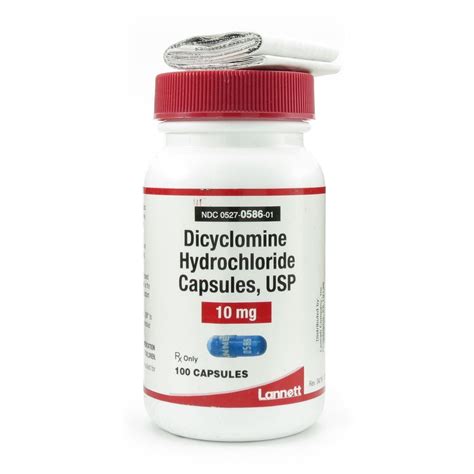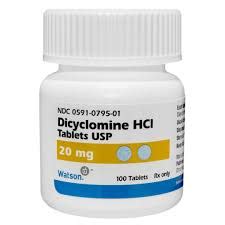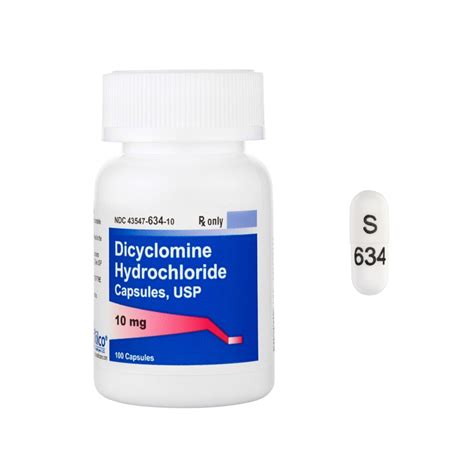Intro
Dicyclomine relieves muscle spasms, treating irritable bowel syndrome and gastrointestinal disorders through anticholinergic effects, smooth muscle relaxation, and analgesic properties.
The human body is a complex system, and various factors can affect its functioning. One such factor is the smooth muscle tone, which plays a crucial role in maintaining the overall health of an individual. Dicyclomine is a medication that targets this aspect, providing relief from various symptoms associated with smooth muscle spasms. In this article, we will delve into the world of Dicyclomine, exploring its mechanisms, benefits, and uses.
Dicyclomine is an anticholinergic medication that has been widely used to treat smooth muscle spasms, particularly in the gastrointestinal tract. Its primary function is to relax the muscles and reduce spasms, thereby alleviating symptoms such as abdominal pain, cramping, and diarrhea. But how exactly does Dicyclomine work its magic? Let's take a closer look at the mechanisms behind this medication.
Dicyclomine has been a topic of interest for many researchers, and its effects on the human body have been extensively studied. By understanding how Dicyclomine works, individuals can better appreciate its benefits and make informed decisions about their health. Whether you're a medical professional or simply someone looking to learn more about this medication, this article aims to provide a comprehensive overview of Dicyclomine's mechanisms and applications.
Introduction to Dicyclomine

How Dicyclomine Relaxes Smooth Muscles
The relaxation of smooth muscles is a critical aspect of Dicyclomine's mechanism. By reducing muscle tone, this medication helps to alleviate symptoms such as abdominal pain and cramping. But how exactly does Dicyclomine achieve this effect? The answer lies in its ability to block the muscarinic receptors, which are responsible for transmitting the signals that stimulate muscle contractions. By inhibiting these receptors, Dicyclomine reduces the frequency and severity of muscle spasms, providing relief from symptoms associated with IBS and other conditions.Mechanisms of Dicyclomine

Benefits of Dicyclomine
The benefits of Dicyclomine are numerous, and this medication has been shown to be effective in treating a range of conditions. Some of the key advantages of Dicyclomine include: * Relief from abdominal pain and cramping: Dicyclomine's ability to relax smooth muscles makes it an effective treatment for symptoms such as abdominal pain and cramping. * Reduction of diarrhea and bowel spasms: By reducing gastrointestinal secretions and modulating gut motility, Dicyclomine can help to alleviate symptoms such as diarrhea and bowel spasms. * Improved quality of life: By providing relief from symptoms associated with IBS and other conditions, Dicyclomine can help to improve an individual's overall quality of life.Uses of Dicycline

Side Effects and Interactions
While Dicyclomine is generally considered safe and effective, it can cause side effects and interact with other medications. Some of the common side effects of Dicyclomine include: * Dry mouth * Dizziness * Drowsiness * Blurred vision * Constipation It's essential to be aware of these potential side effects and to discuss any concerns with a healthcare provider. Additionally, Dicyclomine can interact with other medications, such as antihistamines and decongestants, which can increase the risk of side effects.Dosage and Administration

Precautions and Contraindications
While Dicyclomine is generally considered safe, there are certain precautions and contraindications to be aware of. These include: * Pregnancy and breastfeeding: Dicyclomine should be used with caution in pregnant and breastfeeding women, as it can pass into breast milk and affect the baby. * Children and adolescents: Dicyclomine is not recommended for children under the age of 6, as it can cause adverse effects such as respiratory depression. * Older adults: Older adults may be more susceptible to the side effects of Dicyclomine, such as dry mouth and constipation.Conclusion and Future Directions

As research continues to uncover the complexities of the human body, it's likely that new uses and applications for Dicyclomine will emerge. Whether you're a medical professional or simply someone looking to learn more about this medication, it's essential to stay up-to-date with the latest developments and advancements in the field.
Final Thoughts
Dicyclomine is a medication that has the potential to improve the lives of millions of people around the world. By understanding its mechanisms, benefits, and uses, individuals can make informed decisions about their health and well-being. Whether you're looking to alleviate symptoms associated with IBS or simply want to learn more about this medication, we hope that this article has provided you with a comprehensive overview of Dicyclomine and its applications.What is Dicyclomine used for?
+Dicyclomine is used to treat smooth muscle spasms, particularly in the gastrointestinal tract. It is commonly used to treat irritable bowel syndrome (IBS), functional bowel disorders, and gastrointestinal disorders.
How does Dicyclomine work?
+Dicyclomine works by blocking the action of acetylcholine, a neurotransmitter that stimulates muscle contractions. By inhibiting the effects of acetylcholine, Dicyclomine helps to relax the smooth muscles and reduce spasms.
What are the side effects of Dicyclomine?
+The common side effects of Dicyclomine include dry mouth, dizziness, drowsiness, blurred vision, and constipation. It's essential to be aware of these potential side effects and to discuss any concerns with a healthcare provider.
